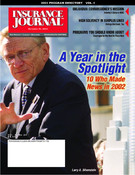Oklahoma Insurance Commissioner Carroll Fisher is a big guy with a mission. In a recent conversation with the Insurance Journal, he spoke of his role as a voice for the industry within the National Association of Insurance Commissioners (NAIC), his successes and challenges as insurance commissioner in his state, and the possibilities of a political future beyond his present office.
IJ: What is your mission as insurance commissioner?
CF: Well, I’m the only insurance commissioner in the nation who’s ever sold insurance for a long term. We’ve got some guys that said, ‘Oh yeah, I tried that once.’ But as far as someone who has successfully been a multi-line insurance agent, I’m the only guy in that position.
As I tell people … I’m sort of their voice inside the NAIC, which many times the industry has felt like they didn’t have, agents always felt like they didn’t have. But I feel like I’m a voice representing insurance agents across the country, not just in Oklahoma, because now I have a national forum to work with….
Many times at the NAIC I feel like the little guy in Tienamen Square standing in front of the tank. Because I’m alone, but I’m the only one that understands the impact of what the NAIC is about to do … many times I’ve had to … take a stand for the companies … for the agents. Because if I didn’t no one else would. … But then I look over my shoulder at the next meeting and I’ll have two more commissioners standing behind me …
The NAIC stands for: No Action Is Contemplated. We take so long to make decisions, I know that if I just stop the tank long enough to voice my concerns and my opinions to other commissioners, I can have an impact, I can make a difference. … So basically my mission has been to be the voice inside the NAIC for the industry as well as the agents across this country.
IJ: And you feel that you’re able to do that because of your background in insurance?
CF: Oh, obviously. After thirty-five years of selling every type of insurance, I had about $3 million P&C insurance on the books when I sold my agency. I had about $800,000 in Transamerica Life insurance premium, about half a million dollars in health insurance premium. … I’ve been there. I’ve sat on that side of the desk with the consumer. I’ve seen the tight markets, the hard markets. I’ve seen every kind of market …
Now I have been given an honor and a privilege to sit as a regulator, trying to keep the balance with the industry, with the agents and with the consumers out there. And I think with my background and my knowledge I’m able to do that probably as good or better than any other commissioner in the nation. …
I have three things I ask the industry in Oklahoma to do for me and that’s to be prompt to respond to the consumer when they have a claim and ask for the promise of their contract to be fulfilled. I ask them to be fair in their adjudication and I ask them to be expedient to get the check out. That makes me a happy guy. … All I want them to do is fulfill the promises of the contract. If we’re going to collect the premium, we’re going to pay the claims when they’re due.
That’s sort of been my charge—to get a good relationship with the industry. I know I’ve been successful with it because I’ve issued 218 new certificates of authority. … And they have come to Oklahoma saying they love the regulatory environment because I encourage the industry to prosper and grow. … They can’t overwrite their reserves in my little state, but they can operate in a friendly regulatory environment.
IJ: In addition to bringing these new companies into Oklahoma, what are some of your other successes?
CF: Another big success that I’ve had was the establishment of my EAGLE program that’s now been recognized nationally. EAGLE stands for: Ending Arguments Gently, Legally and Economically. It’s a mediation program that’s been approved by the Oklahoma Supreme Court. Our largest settlement in that program has been $300,000; it’s averaged about $53,000 per case. It’s a program where we can resolve things in three hours, not three months or three years, in the courthouse.
We’re trying to prove to consumers that you don’t have to have an attorney for adjudication of a dispute with an insurance company. We’re in such a litigious society today that it’s unbelievable the kind of settlements they’re getting out of the industry. And I can’t blame (companies) when they say they’re going to pull out of a certain environment because of the way they’re being treated. We’ve got to have some tort reform; we’ve got to have some way to control some of these losses. The industry doesn’t mind paying for valid losses. That’s what they’re there for; that’s what they expect to do; that’s why they charge appropriate premiums. …
But to have an attorney come in and penalize the industry because he knows there are deep pockets … and the kind of judgments and settlements we’re seeing … we’ve gone too far. And legislatures across the country have got to put some caps on these types of environments.
IJ: Do you see that kind of tort reform happening in Oklahoma?
CF: We’re going to be promoting it. The problem that we have, as you have in many legislative situations, is you’ve got so many trial lawyers “in the legislature.”. . . And attorneys have a little bit more flexibility with their personal time and their ability to earn money other than their legislative amount.
I think if we do nothing other than just say—if you’re going to pass a bill, if it has a conflict of interest and you have a potential gain from it, you can’t vote on the bill—so that bills that are really appropriate are not killed by those who are going to benefit or gain (from not passing them). And that many times happens—they won’t let them out of committee.
IJ: How would you describe the other challenges you’re facing?
CF: I haven’t quit trying to get regulatory authority over HMOs. That’s under the health department, but 50 percent of my calls that come into the insurance department relate to someone’s health insurance, or healthcare, or HMOs. And I have to refer them to the health department.
I’ve been trying for the last four years to get financial solvency, market conduct and consumer assistance. Like I tell ’em, I don’t want to tell you how hot to cook your turkey. The health department does a good job at that. I don’t want to do accreditation of doctors; I don’t want to do accreditation of hospitals. But those three areas—I know we do financial solvency better than anybody, I’ve already looked at 1,800 companies. I’ve got 107 domestics we examine every three years. I know we do a good job in that area.
… So we’re trying to do that … It looks like it’s going to take legislation this coming year to move that authority for those three items. They tried to contract with me last year … and what they tried to do was to give me responsibility with no authority. And I said … no, no, no.
The other thing that we’ve not been able to do is we haven’t been able to get the uninsured motorist off the streets in Oklahoma. And that’s common throughout the country; this is not just an Oklahoma problem. … And we … have been held hostage on this by the trial attorneys (who) don’t want the law that I want to promote.
What I would like to do is say: If you’re going to go out and violate state law—our present law is you have to have 10-20-10 of liability insurance—if you’re going to go out and violate that law and put yourself in harm’s way, to me then you should be accepting the responsibility of limiting the recovery from anybody you’re involved in an accident with to no more than what you should have carried by state law and didn’t carry. … If you’re at fault I have no recovery. You should not have, when you violate state law, full recovery of my $100- or $300 (thousand) or half a million.…
The other problem we’ve had in Oklahoma … and I don’t know how big this problem is, but three people called me and for those three people that’s way too many. What happened is they were in the middle of a claim with their homeowners (insurer). … House under reconstruction, their renewal date came and they got a cancellation notice,… Where’s this guy going to go? There’s nobody out there that’s going to write a guy that doesn’t even have his house finished…
So what I’m trying to get the industry to do is do the right thing for the right reason. And that is to give them an opportunity to not do an annual renewal … (but) do a 30-day rollover renewal every 30 days until that claim is finalized. And then give them 45 days from the date of the last check to cancel the insurance and get of the risk. At least now the new carrier is looking at a whole house, something that’s been repaired, and has an opportunity to make an evaluation as to whether they want to accept the risk or not.
IJ: Is there a political life for Carroll Fisher after insurance commissioner?
CF: I get asked that from time to time … but I love the job so much… that I don’t know. I’ve had people ask me if I would run for governor and it’s an honor to be asked. … I’ve now had people ask me if I would run for a congressional seat in Oklahoma, because I’ve been across the state of Oklahoma and become known. …
I don’t know if the future holds something … my wife keeps saying ‘don’t say the G-word.’ She doesn’t want to be the first lady of the state. I say, ‘I consider you to be the first lady of the insurance industry, so what’s the difference?’
But I touch more lives than anybody in the state of Oklahoma. I touch everybody from funeral directors, bail bondsmen, real estate agents, claims adjusters, agents and 1,800 companies; and I can really do a great thing for Oklahoma and we’ve done that.
Topics Agencies Legislation Oklahoma
Was this article valuable?
Here are more articles you may enjoy.


 MAPFRE Denied Injunction Against AAA Auto Insurance Sales in Massachusetts
MAPFRE Denied Injunction Against AAA Auto Insurance Sales in Massachusetts  Chubb Posts Record Q4 and Full Year P/C Underwriting Income, Combined Ratio
Chubb Posts Record Q4 and Full Year P/C Underwriting Income, Combined Ratio  Beazley Agrees to Zurich’s Sweetened £8 Billion Takeover Bid
Beazley Agrees to Zurich’s Sweetened £8 Billion Takeover Bid  Lawyer for Prominent Texas Law Firm Among Victims ID’d in Maine Plane Crash
Lawyer for Prominent Texas Law Firm Among Victims ID’d in Maine Plane Crash 


